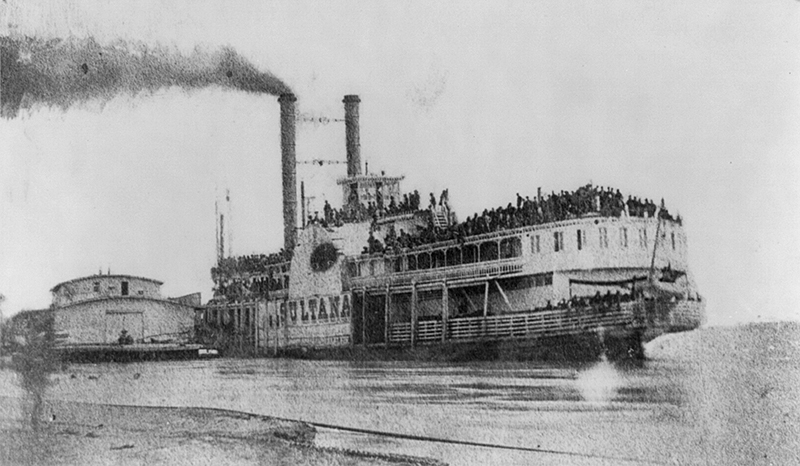Sultana disaster was the worst maritime disaster in United States history. It took place on the Mississippi River on April 27, 1865. The Sultana, a paddle steamer, was traveling near Memphis, Tennessee, when its boilers (metal vessels used to heat water) exploded. About 1,700 people died in the disaster. Most of the dead were Union soldiers in the American Civil War (1861-1865). The captain of the Sultana was J. Cass Mason.

The Sultana was completed and launched in 1863. It was designed to carry 376 passengers and crew. On April 21, 1865, the Sultana left New Orleans. It carried some civilian passengers, livestock, and various goods. On April 23, the ship arrived in Vicksburg, Mississippi. On the way there, the ship’s engineer had discovered that a boiler was leaking. The boiler was hurriedly repaired.
At Vicksburg, the Sultana picked up a number of Northerners who had been held prisoner during the Civil War. Many had been recently released from harsh Confederate-run prison camps such as the one at Andersonville, Georgia. Historians estimate that more than 2,000 freed prisoners boarded the ship at Vicksburg. The ship departed on April 24.
Upon leaving Vicksburg, the Sultana was severely overcrowded, with about 2,300 people on board. In addition to the freed prisoners, the ship carried about 100 civilian passengers and about 85 crew members. At that time, boat owners often overcrowded their ships because the government paid them for each soldier and freed prisoner they transported. In addition, many soldiers were willing to board overcrowded ships because they were so eager to get home.
On the evening of April 26, the Sultana stopped at Memphis. The ship left Memphis around midnight.
Early in the morning of April 27, one of the Sultana’s boilers exploded. The initial explosion led to the explosion of two other boilers, and a fire spread through the ship. Many people died when they were either scalded with hot water or burned in the fire. The force of the explosion hurled some people into the cold Mississippi River. Others jumped into the river to avoid the fire. The river’s strong current made it difficult for people to swim. Many of the recently released prisoners—weakened by their time at prison camps—were unable to reach shore.
Historians estimate that about 1,700 people were killed in the disaster. A military commission charged Captain Frederick Speed, one of the officers responsible for loading the Sultana, with overcrowding the ship. A five-month court-martial found Speed guilty. However, the Army later reversed the verdict and closed its investigation.
